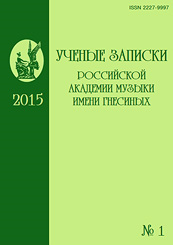Музыкальная эстетика
Reference:
Christoph Flamm (2014). Esthetical views of Nikolai Medtner. Protecting the
unwritten laws: «The Muse and the Fashion» (chapter from the book
«Russian composer Nikolai Medtner» (translated by Maria Mokhova
and Ruslan Razgouliaev). Scientific notes of the Gnesins Russian Academy of Music, 3, 3–34. https://en.nbpublish.com/library_read_article.php?id=66087
Abstract:
Christoph Flamm has released a fundamental scholarly work «Russian Composer
Nikolai Medtner. Research and materials» in Berlin in 1995. Until now this is the best
foreign book on Medtner.
In the present paper the author is presenting Medtner’s book «The Muse and
the Fashion» putting it into the broad context of esthetical ideas from early antique
philosophers to German idealists. The scope of issues presented is very broad:
Medtner’s literary writing, the story of «The Muse and the Fashion»’s creation
as well as putting together Medtner’s literary and musical works. The narration
is very intense and exceptional especially having in mind the deficiencies of Russian
musicological research on Medtner. The translation is made in collaboration with
the author and includes some corrections as compared with the first publication where
some details need to be reconsidered.
Keywords:
N.K. Medtner, «The Muse and the Fashion», Russian musical esthetics of the XXth century.
Музыка XX века
Reference:
Tatiana Tsaregradskaya (2014). Toru Takemitsu: between Painting and Music. Scientific notes of the Gnesins Russian Academy of Music, 3, 35–54. https://en.nbpublish.com/library_read_article.php?id=66088
Abstract:
The paper is about the attitude of a prominent XXth century composer Toru
Takemitsu to painting in general and particularly to his favourite artists Odilon Redon,
Paul Klee and Juan Miro. Diverse Japanese gardens are also among visual stimulus
where he found inspiration that is also reflected in different aspects of his musical
writing.
Keywords:
Toru Takemitsu, painting, Odilon Redon, Paul Klee, Juan Miro.
Reference:
Dina Kirnarskaya (2014). Musical prodigies: «fakes» and «realities». Scientific notes of the Gnesins Russian Academy of Music, 3, 55–73. https://en.nbpublish.com/library_read_article.php?id=66089
Abstract:
Musical prodigies as a phenomenon are known during several centuries while children
appearing on concert stage are being used as a commercial product. There exists
a supposition that such exploitation since early age could be the reason for their «burning
out» when their talent fades away leading to various psychological traumas. The author
argues that although such views are basically convincing it’s possible to offer another
hypothesis based on psychological similarity of prodigies and so called «idiots-savants»,
autistic children and teenagers with extraordinary abilities. The author is offering
various arguments to support her idea: according to the paper’s discourse «burned out»
prodigies who failed to develop into outstanding musicians could share with idiots-savants autistic predisposition based on communication deficiencies connected in the
to expressive ear for music. Expressive ear can be considered «communication centre»
of musical talent referring to non-notational features of music.
Keywords:
wunderkind, absolute pitch, savant, autism, expressive ear for music.
Из истории русской музыкальной культуры
Reference:
Aliya Saduova (2014). Impressionism in «Russian works» by N.N. Cherepnin
(at the example of Sketches to the firebird tale «The Charmed Kingdom»). Scientific notes of the Gnesins Russian Academy of Music, 3, 74–81. https://en.nbpublish.com/library_read_article.php?id=66090
Abstract:
The paper is a research on impressionistic features of «Russian» works by N.N. Cherepnin
at the example of his sketches to the fairy tale on firebird «The Charmed
Kingdom». Themes of the miniature being born out of one core, timbre and harmony
with their picturesque atmosphere are the natural ground for the impressionistic landscape
created by the music.
Keywords:
impressionism, Russian music, N.N. Cherepnin, «Charmed Kingdom».
Исполнительское искусство
Reference:
Elena Baykowa (2014). Looking back and looking forward. Scientific notes of the Gnesins Russian Academy of Music, 3, 82–89. https://en.nbpublish.com/library_read_article.php?id=66091
Abstract:
The paper is describing philosophical and aesthetic views of Vladimir Minin,
the choir conductor and outstanding musician of our time. At the example of Moscow
Chamber choir the author is analyzing its repertoire strategy that is fostering the growth
of the group’s mastery and professionalism. Vladimir Minin shares with the author
his views on the prospects of modern choir singing, its artistic mission trying to express
his vision of past, present and future of this popular kind of musicianship.
Keywords:
V.N. Minin, artistic strategy, repertoire, conductor, choir genre, chamber music.
 This work is licensed under a Creative Commons Attribution-NonCommercial 4.0 International License.
This work is licensed under a Creative Commons Attribution-NonCommercial 4.0 International License.
 Eng
Eng











 © 1998 – 2025 Nota Bene. Publishing Technologies. NB-Media Ltd.
© 1998 – 2025 Nota Bene. Publishing Technologies. NB-Media Ltd.




